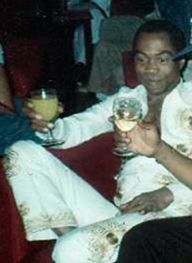Afrobeat (also known as Afrofunk) is a Nigerian music genre that involves the combination of West African musical styles from mainly Nigeria such as the traditional Yoruba and Igbo music and highlife with American funk, jazz, and soul influences.[1] With a focus on chanted vocals, complex intersecting rhythms, and percussion.[2] The style was pioneered in the 1960s by Nigerian multi-instrumentalist and bandleader Fela Kuti, who is most known for popularizing the style both within and outside Nigeria. At the height of his popularity, he was referred to as one of Africa’s most “challenging and charismatic music performers.”[3]
Distinct from Afrobeat is Afrobeats, a combination of sounds originating in West Africa in the 21st century. This takes on diverse influences and is an eclectic combination of genres such as hip hop, house, jùjú, ndombolo, R&B, soca, and dancehall.[4][5][6][7][8][9] The two genres, though often conflated, are not the same as Afrobeat is just the amalgamation of afrobeats .[5][6]

History

Afrobeat evolved in Nigeria in the late 1960s by Fela Anikulapo Kuti,( born Olufela Olusegun Oludotun) who, with drummer Tony Allen, experimented with different contemporary music of that time. Afrobeat was influenced by a combination of different genres, such as highlife, fuji, and jùjú,[10] as well as Yoruba vocal traditions, rhythm, and instruments.[11] In the late 1950s, Kuti left Lagos to study abroad at the London School of Music where he took lessons in piano,[12] and percussion[13] and was exposed to jazz . Fela Kuti returned to Lagos and played a highlife-jazz hybrid, albeit, without commercial success.[2]
In 1969, Kuti and his band went on a trip to the U.S. and met a woman by the name of Sandra Smith, a singer and former Black Panther. Sandra Smith (now known as Sandra Izsadore or Sandra Akanke Isidore) introduced Kuti to many writings of activists such as Martin Luther King Jr., Angela Davis, Jesse Jackson, and his biggest influence of all, Malcolm X.[5]
As Kuti was interested in African-American politics, Smith would make it his duty to inform Kuti of current events. In return, Kuti would fill her in on African culture. Since Kuti stayed at Smith’s house and spent so much time with her, he started to re-evaluate his music genre. That was when Kuti realized that he was not playing African music. From that day forward, Kuti changed his sound and the message behind his music.[14]
Upon arriving in Nigeria, Kuti had also changed the name of his group to “Africa ’70“. The new sound hailed from a club he established called the Afrika Shrine. The band maintained a five-year residency at the Afrika Shrine from 1970 to 1975 while Afrobeat thrived among Nigerian youth.[5] Another influential person Ray Stephen Oche, a Nigerian musician touring from Paris, France, with his Matumbo orchestra in the 1970s.
